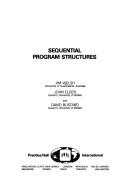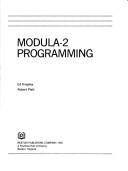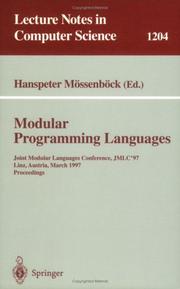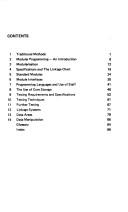| Listing 1 - 10 of 16 | << page >> |
Sort by
|
Book
ISBN: 0269671919 Year: 1969 Publisher: London Pall mall
Abstract | Keywords | Export | Availability | Bookmark
 Loading...
Loading...Choose an application
- Reference Manager
- EndNote
- RefWorks (Direct export to RefWorks)
Book
ISBN: 0876268793 Year: 1980 Publisher: Cambridge Winthrop
Abstract | Keywords | Export | Availability | Bookmark
 Loading...
Loading...Choose an application
- Reference Manager
- EndNote
- RefWorks (Direct export to RefWorks)

ISBN: 0138068283 9780138068288 Year: 1984 Publisher: Englewood Cliffs, NJ : Prentice-Hall International,
Abstract | Keywords | Export | Availability | Bookmark
 Loading...
Loading...Choose an application
- Reference Manager
- EndNote
- RefWorks (Direct export to RefWorks)
Modular programming --- Pascal (Computer program language) --- List structures --- Tables structure
Book
ISBN: 1523125365 9781523125364 Year: 2018 Publisher: Birmingham ; Mumbai : Packt,
Abstract | Keywords | Export | Availability | Bookmark
 Loading...
Loading...Choose an application
- Reference Manager
- EndNote
- RefWorks (Direct export to RefWorks)
Mastering advanced features of Java and implement them to build amazing projects About This Book Take advantage of Java's new modularity features to write real-world applications that solve a variety of problems Explore the major concepts introduced with Java 9, including modular programming, HTTP 2.0, API changes, and more Get to grips with tools, techniques and best practices to enhance application development Who This Book Is For This learning path is for Java developers who are looking to move a level up and learn how to build robust applications in the latest version of Java. What You Will Learn Package Java applications as modules using the Java Platform Module System Implement process management in Java using the all-new process handling API Integrate your applications with third-party services in the cloud Interact with mail servers, using JavaMail to build an application that filters spam messages Use JavaFX to build rich GUI-based applications, which are an essential element of application development Leverage the possibilities provided by the newly introduced Java shell Test your application's effectiveness with the JVM harness See how Java 9 provides support for the HTTP 2.0 standard In Detail Java 9 and its new features add to the richness of the language; Java is one of the languages most used by developers to build robust software applications. Java 9 comes with a special emphasis on modularity with its integration with Jigsaw. This course is your one-stop guide to mastering the language. You'll be provided with an overview and explanation of the new features introduced in Java 9 and the importance of the new APIs and enhancements. Some new features of Java 9 are ground-breaking; if you are an experienced programmer, you will be able to make your enterprise applications leaner by learning these new features. You'll be provided with practical guidance in applying your newly acquired knowledge of Java 9 and further information on future developments of the Java platform. This course will improve your productivity, making your applications faster. Next, you'll go on to implement everything you've learned by building 10 cool projects. You will learn to build an email filter that separates spam messages from all your inboxes, a social media aggregator app that will help you efficiently track various feeds, and a microservice for a client/server note application, to name just a few. By the end of this course, you will be well acquaint...
Java (Computer program language) --- Modular programming. --- Application software --- Development.
Book
ISBN: 9781836208648 Year: 2024 Publisher: Birmingham, England : Packt Publishing Ltd,
Abstract | Keywords | Export | Availability | Bookmark
 Loading...
Loading...Choose an application
- Reference Manager
- EndNote
- RefWorks (Direct export to RefWorks)
Begin with an introduction to Kubernetes, understanding its importance and architecture. These foundational chapters will set the stage for your exploration into Kubernetes' capabilities. As you progress, you'll learn how to set up Kubernetes and containerize an application, equipping you with practical skills for real-world application management. The course continues with a focus on running applications on Kubernetes, where you will delve into self-healing mechanisms, scaling, and performing rolling updates. Each chapter builds on the last, ensuring a seamless learning experience that integrates theoretical knowledge with hands-on practice. You'll understand how Kubernetes maintains application health and performance, providing a robust environment for modern applications. Concluding with advanced operational techniques and future steps, the course prepares you to leverage Kubernetes for continuous development and deployment. Whether you're scaling applications to meet demand or ensuring seamless updates with minimal downtime, you'll be equipped with the skills necessary for efficient and effective Kubernetes management. This course is your gateway to becoming proficient in one of the most essential tools in the DevOps toolkit.
Software container technologies. --- Modular programming --- Global software development --- Computer programs.
Book
ISBN: 1785883208 9781785883200 9781785888823 178588882X Year: 2016 Publisher: Birmingham
Abstract | Keywords | Export | Availability | Bookmark
 Loading...
Loading...Choose an application
- Reference Manager
- EndNote
- RefWorks (Direct export to RefWorks)

ISBN: 0835946029 9780835946025 9780835946032 0835946037 Year: 1985 Publisher: Englewood Cliffs: Prentice Hall,
Abstract | Keywords | Export | Availability | Bookmark
 Loading...
Loading...Choose an application
- Reference Manager
- EndNote
- RefWorks (Direct export to RefWorks)
Text Processing --- Case Study --- Text Editor --- Modula-2 (Langage de programmation) --- Modular Programming
Book
ISBN: 1786461463 9781786461469 1786462958 9781786462954 Year: 2016 Publisher: Birmingham, [England] : Packt Publishing,
Abstract | Keywords | Export | Availability | Bookmark
 Loading...
Loading...Choose an application
- Reference Manager
- EndNote
- RefWorks (Direct export to RefWorks)
Utilize the power of modular programming to improve code readability, maintainability, and testability About This Book This book demonstrates code reusability and distributed development to get high speed, maintainable, and fast applications It illustrates the development of a complete modular application developed using PHP7 in detail This book provides a high-level overview of the Symfony framework, a set of tools and a development methodology that are needed to build a modular web shop application Who This Book Is For This step-by-step guide is divided into two sections. The first section explores all the fundamentals of modular design technique with respect to PHP 7. The latter section demonstrates the practical development of individual modules of a web shop application. What You Will Learn Discover the new features of PHP 7 that are relevant to modular application development Write manageable code based on the GoF design patterns and SOLID principles Define the application requirements of a working modular application Explore the ins and outs of the Symfony framework Build a set of modules based on the Symfony framework that comprise a simple web shop app Use core modules to set the structure and dependencies for other modules to use Set up entities that are relevant to the module functionality and see how to manage these entities In Detail Modular design techniques help you build readable, manageable, reusable, and more efficient codes. PHP 7, which is a popular open source scripting language, is used to build modular functions for your software. With this book, you will gain a deep insight into the modular programming paradigm and how to achieve modularity in your PHP code. We start with a brief introduction to the new features of PHP 7, some of which open a door to new concepts used in modular development. With design patterns being at the heart of all modular PHP code, you will learn about the GoF design patterns and how to apply them. You will see how to write code that is easy to maintain and extend over time with the help of the SOLID design principles. Throughout the rest of the book, you will build different working modules of a modern web shop application using the Symfony framework, which will give you a deep understanding of modular application development using PHP 7. Style and approach This book is for intermediate-level PHP developers with little to no knowledge of modular programming who want to understand design patterns...

ISBN: 3540625992 3540683283 9783540625995 Year: 1997 Volume: 1204 Publisher: Berlin Springer
Abstract | Keywords | Export | Availability | Bookmark
 Loading...
Loading...Choose an application
- Reference Manager
- EndNote
- RefWorks (Direct export to RefWorks)
This book constitutes the refereed proceedings of the Joint Modular Languages Conference, JMLC'97, held in Linz, Austria, in March 1997. The 24 revised full papers presented were carefully selected from a total of 55 submissions; also included are full papers of two invited presentations. The book is devoted to languages, techniques, and tools for the development of modular, extensible, and type-safe software systems. Among the programming languages covered are Modula, Oberon, Ada95, Eiffel, Salher, Java, and others. The issues addressed include compiler technology, persistence, data structures, typing, distribution, active objects, real-time programming, inheritance, reflection, languages, etc.
Programming --- Modular programming --- Programming languages (Electronic computers) --- Congresses. --- Computer Science --- Engineering & Applied Sciences --- Congresses --- Computer science. --- Computer programming. --- Software engineering. --- Programming languages (Electronic computers). --- Operating systems (Computers). --- Computer Science. --- Programming Languages, Compilers, Interpreters. --- Software Engineering. --- Programming Techniques. --- Operating Systems. --- Computer operating systems --- Computers --- Disk operating systems --- Systems software --- Computer software engineering --- Engineering --- Informatics --- Science --- Operating systems --- Computer languages --- Computer program languages --- Computer programming languages --- Machine language --- Electronic data processing --- Languages, Artificial --- Electronic computer programming --- Electronic digital computers --- Programming (Electronic computers) --- Coding theory --- Modular programming - Congresses. --- Programming languages (Electronic computers) - Congresses. --- Operating systems (Computers)

ISBN: 0408702877 9780408702874 Year: 1972 Publisher: London Butterworths
Abstract | Keywords | Export | Availability | Bookmark
 Loading...
Loading...Choose an application
- Reference Manager
- EndNote
- RefWorks (Direct export to RefWorks)
programmeertalen --- programmeren (informatica) --- Computer science --- informatica --- Computer programming --- Modular programming --- Management --- -681.3*D22 --- Computers --- Electronic computer programming --- Electronic data processing --- Electronic digital computers --- Programming (Electronic computers) --- Coding theory --- Tools and techniques: decision tables; flow charts; modules and interfaces; programmer workbench; software libraries; structured programming; top-down programming; user interfaces (Software engineering) --- Programming --- Modular programming. --- Management. --- 681.3*D22 Tools and techniques: decision tables; flow charts; modules and interfaces; programmer workbench; software libraries; structured programming; top-down programming; user interfaces (Software engineering) --- 681.3*D22 --- Computer programming management --- Programming management (Electronic computers) --- Systèmes, Conception de --- System design --- Langages de programmation --- Computer programming - Management --- Systèmes, Conception de
| Listing 1 - 10 of 16 | << page >> |
Sort by
|

 Search
Search Feedback
Feedback About UniCat
About UniCat  Help
Help News
News